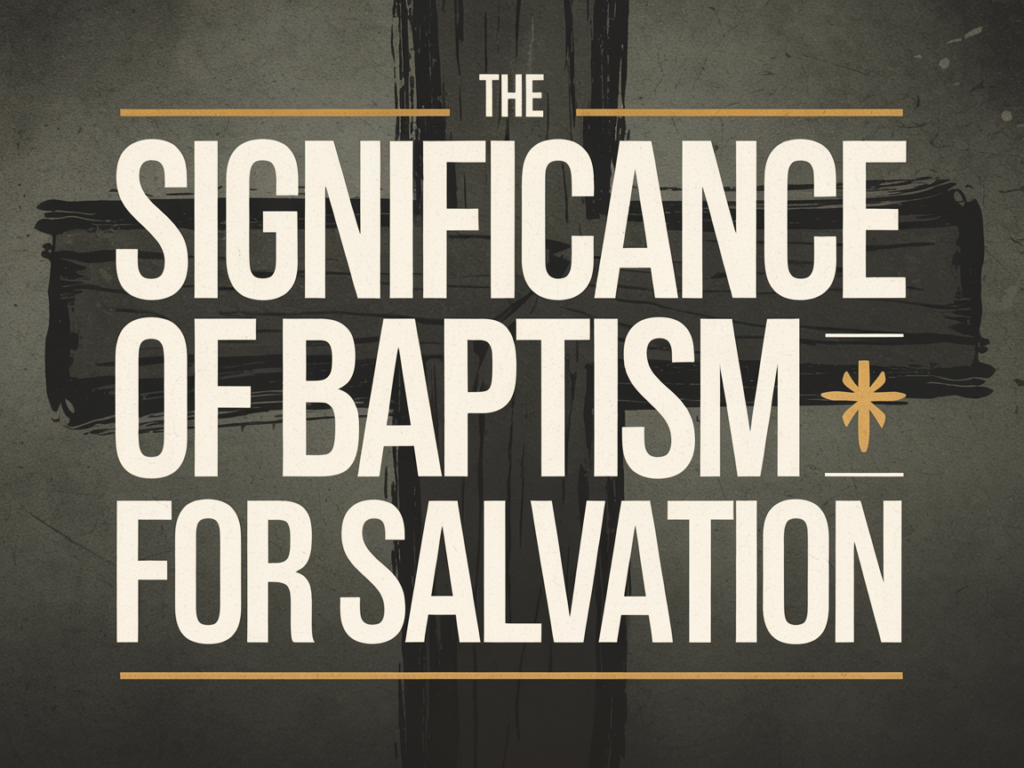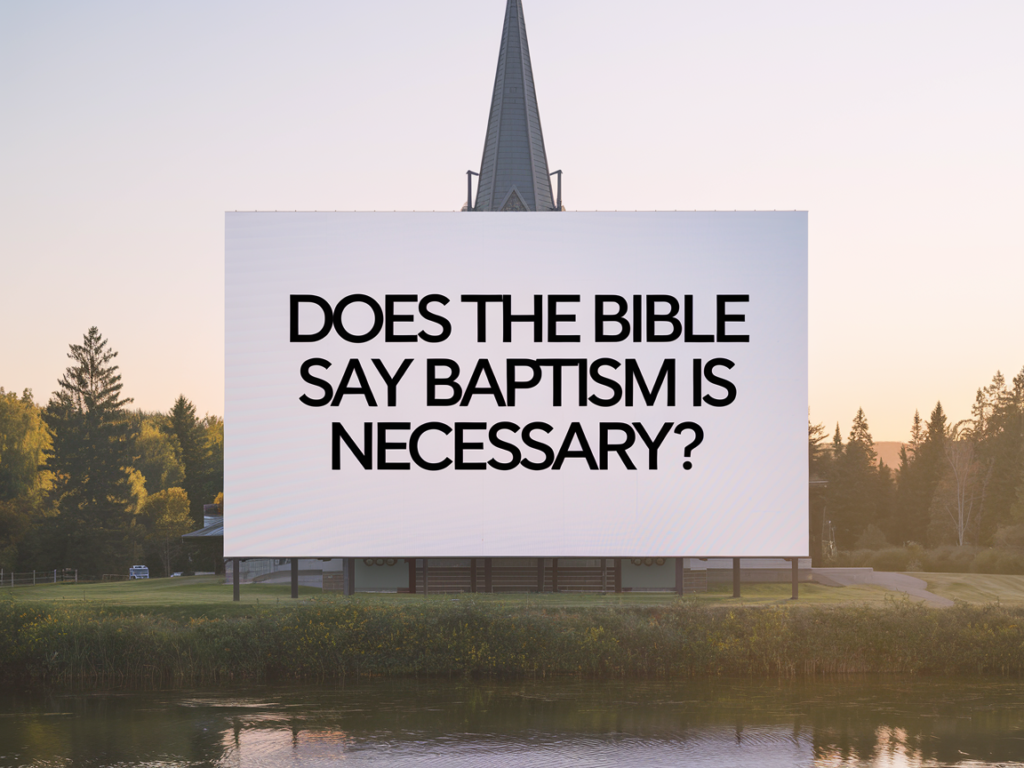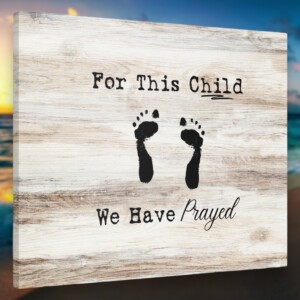
Why do Christians get baptized according to the Bible?
This isn’t some old church tradition or ritual for super-religious people—it’s something Jesus Himself commanded. I didn’t always realize how serious baptism was until I actually opened my Bible and looked at what it said, not what I had heard growing up.
Jesus said in Mark 16:16 (KJV), “He that believeth and is baptized shall be saved; but he that believeth not shall be damned.” He didn’t say “believe only.” He tied believing and baptism together as part of salvation. That hit me hard the first time I really saw it.
When Peter preached the very first gospel sermon in Acts 2, and the crowd asked what they needed to do, he didn’t say “just believe” or “pray a prayer.” He said, “Repent, and be baptized every one of you in the name of Jesus Christ for the remission of sins…” (Acts 2:38). That means baptism isn’t optional—it’s where the remission of sins happens. You don’t get your sins forgiven by feeling sorry or going to church. It’s by obeying what God said.
And if you haven’t seen this already, The Path to Salvation breaks this all down—every step clearly laid out from Scripture. It’s not a checklist. It’s a transformation. And baptism is a key part of it.
When someone asks “Why do Christians get baptized?”—it’s simple. Because Jesus said to. Because it’s the moment when we obey the gospel. Because it’s where we step into His death and resurrection, not just in theory, but for real.

What does baptism mean in Christianity?
To really get the meaning of baptism, you’ve got to understand what happens spiritually when a Christian is baptized. It’s not just getting dunked in water. It’s dying to yourself—just like Jesus died—and then being raised into a new life, just like He rose from the grave.
That’s why Romans 6:3–4 (KJV) is so important. It says we are “baptized into his death,” and we’re “buried with him by baptism into death,” and then raised “to walk in newness of life.” That’s not poetic language. It’s a picture of what actually happens in baptism. The old you is buried, and the new you is raised up in Christ.
Baptism is where we “put on Christ” according to Galatians 3:27—“For as many of you as have been baptized into Christ have put on Christ.” That’s powerful. You’re not just saying you follow Jesus—you’re clothed in Him. Marked as His.
This is why I don’t buy into the “it’s just symbolic” idea. It’s not. It’s the moment sins are washed away (Acts 22:16), the Holy Spirit is given (Acts 2:38), and we are added to the church—the body of Christ (Acts 2:41, 47).
The Significance of Baptism for Salvation really lays this out clearly too. If you’re not sure what your baptism meant or whether you’ve truly been baptized biblically, that article will help guide you deeper into truth.
The meaning of baptism isn’t about what your church teaches—it’s about what the Word of God teaches. And once you see it, you can’t unsee it. It’s where your past dies, and your real life begins.

Is baptism required for salvation?
This is the question that gets people fired up—but instead of going off opinions, I had to learn to go straight to what the Bible actually says. Once I did, it became undeniable. Yes, baptism is required for salvation. Not because I said it. Not because your preacher said it. But because God said it.
Let’s go back to Acts 2:38 again—Peter didn’t suggest baptism. He commanded it: “Repent, and be baptized…for the remission of sins.” That word “for” means “in order to receive,” not “because you already got.” If sins were already forgiven before baptism, Peter would’ve just said “Repent.” But he didn’t.
1 Peter 3:21 (KJV) is even more blunt. It says, “The like figure whereunto even baptism doth also now save us…” Let that soak in. Baptism doth also now save us. That’s not symbolic. That’s not optional. That’s salvation.
It doesn’t take away from grace or faith. It works hand-in-hand with both. Baptism is where faith and obedience meet the blood of Jesus. As Paul said in Colossians 2:12, it’s where we’re buried with Christ and raised through faith in the operation of God—not the power of the water, but the power of God working through our obedience.
And this isn’t just some Church of Christ doctrine—it’s the exact message preached in the early church. The early church’s view on baptism wasn’t complicated. They preached baptism, practiced it immediately, and never treated it as “just a symbol.”
If you’re still unsure, go read What Must I Do to Be Saved?—it’s written plainly, straight from Scripture. No fluff, no loopholes.
So yes, baptism is required. Not because we’re earning salvation, but because that’s the moment we step into it by faith and obedience.

What happens when someone is baptized?
I used to wonder if something spiritual actually happened during baptism, or if it was just a “public display” like I’d heard so many preachers say. But once I started actually reading the Bible for myself, I realized—baptism isn’t just a symbol. It’s where everything changes.
In Acts 22:16 (KJV), Ananias told Paul, “And now why tarriest thou? arise, and be baptized, and wash away thy sins, calling on the name of the Lord.” That verse alone shook me. Paul’s sins weren’t forgiven when he believed, or when he fasted and prayed. They were washed away at baptism. That’s when his old life ended, and his new one began.
When someone is baptized, here’s what happens according to Scripture:
- Sins are washed away (Acts 22:16)
- You’re buried and raised with Christ (Romans 6:4)
- You receive the gift of the Holy Spirit (Acts 2:38)
- You put on Christ (Galatians 3:27)
- You are added to the Lord’s church (Acts 2:41, 47)
- You are saved (1 Peter 3:21)
That’s not symbolic. That’s a real spiritual transaction happening in obedience.
I talk with people all the time who say, “Well, I was baptized, but I didn’t really understand it then.” And I get that—many of us were taught a watered-down version of the truth. If you want clarity, this article explains what real Bible baptism looks like. You’ll see how important it is to know what you’re doing—and why.
It’s also the exact point where God saves—not before, and not later. Understanding salvation clearly puts it all in line with Scripture. Not man-made steps. Not guesswork. Just truth straight from God’s Word.
When you’re baptized the way the Bible teaches, you’re not just getting wet—you’re being transformed, cleansed, sealed, and saved. That’s why it matters so much.

What are the most important Bible verses about baptism?
When I finally stopped relying on what people told me about baptism and actually opened my Bible, I was blown away. The Word of God doesn’t just mention baptism—it emphasizes it, commands it, and connects it directly to salvation over and over again.
Here are some of the most powerful Bible verses about baptism that helped open my eyes:
Mark 16:16 (KJV):
“He that believeth and is baptized shall be saved; but he that believeth not shall be damned.”
Jesus Himself said this. Not a preacher. Not a church tradition. Jesus.
Acts 2:38:
“Repent, and be baptized every one of you in the name of Jesus Christ for the remission of sins…”
The first gospel sermon ever preached—and Peter didn’t hesitate to include baptism as the response to the gospel.
Romans 6:3–4:
“Know ye not, that so many of us as were baptized into Jesus Christ were baptized into his death?”
“Therefore we are buried with him by baptism into death…”
Baptism isn’t symbolic—it’s our connection to Christ’s death, burial, and resurrection.
Galatians 3:27:
“For as many of you as have been baptized into Christ have put on Christ.”
You don’t “put on Christ” by raising your hand or saying a prayer. It happens when you’re baptized.
1 Peter 3:21:
“The like figure whereunto even baptism doth also now save us…”
Not only is this plain, it actually says baptism saves us. That’s not a metaphor.
Acts 22:16:
“…arise, and be baptized, and wash away thy sins…”
This was Paul—after seeing Jesus, after believing—being told to be baptized to have his sins washed away.
Every one of these verses makes it clear: baptism is not optional. It’s where everything changes. And yet, sadly, it’s one of the most misunderstood parts of the Christian walk.
If you want to explore more about how the early Christians practiced baptism and what they taught, check out this breakdown of Church of Christ baptism. It shows how deeply biblical this teaching is—and how far the modern world has drifted from it.
The Bible isn’t confusing. It’s just often ignored. Baptism isn’t a church tradition—it’s God’s command.

Why was Jesus baptized if He never sinned?
This question got me thinking when I first read about Jesus’ baptism. I mean, why would the sinless Son of God need to be baptized? He never sinned. He didn’t need forgiveness. But He still walked into the Jordan River and let John immerse Him in front of everyone. Why?
Jesus didn’t do it for Himself. He did it to fulfill all righteousness.
In Matthew 3:13–15 (KJV), when John the Baptist hesitated to baptize Jesus, Jesus replied, “Suffer it to be so now: for thus it becometh us to fulfil all righteousness.” He wasn’t being baptized because He needed cleansing—He was showing obedience to the Father’s will and setting the standard for us to follow.
Jesus’ baptism also marked the beginning of His public ministry, and it was the moment where the Holy Spirit descended on Him, and the Father’s voice was heard from heaven saying, “This is my beloved Son, in whom I am well pleased.” (Matthew 3:17)
It wasn’t just a personal act—it was a declaration. A moment of submission. A model for everyone who would follow Him.
It also perfectly aligns with how baptism works in our lives. When we’re baptized, we’re not just taking a public step—we’re submitting to God, showing we trust His plan, and stepping into a new life. That’s why understanding what real baptism means matters so much. If you’re wondering how all this ties into salvation, this article on the thief on the cross and baptism clears up a lot of the confusion people have around this issue.
Jesus didn’t ask us to do anything He wasn’t willing to do first. So while He had no sin to wash away, He still stepped into that water to lead the way—so we could follow.

What did the early church believe about baptism?
If there’s one thing the early church didn’t do—it was argue about whether baptism was necessary. They knew it was. They practiced it immediately. And they didn’t separate it from salvation the way modern churches often do today.
Right after Peter preached the gospel in Acts 2, about 3,000 people were baptized that same day (Acts 2:41). No waiting. No “sign-up sheet for next month.” No “optional class.” They heard, they believed, they repented, and they were baptized—all in the same day.
This wasn’t a rare event either. In Acts 8, when the Ethiopian eunuch understood the gospel from Philip, his response wasn’t, “I’ll think about it.” It was, “See, here is water; what doth hinder me to be baptized?” (Acts 8:36 KJV). And they went straight into the water—no delay, no excuses.
Even Paul, after being blinded on the road to Damascus, spent three days fasting and praying. But when Ananias came to him, he didn’t say, “Good job, your faith has saved you.” He said, “And now why tarriest thou? arise, and be baptized, and wash away thy sins…” (Acts 22:16)
The early church didn’t treat baptism as a symbol. They treated it as the God-ordained moment when sins were washed away, the Spirit was given, and a person became part of Christ’s body.

If you want more insight into what they actually practiced, this article on surprising facts about Church of Christ baptism digs deeper into how the earliest Christians understood and obeyed this command. Spoiler: they took it way more seriously than most churches today.
When I read how they responded in the book of Acts, I realized I had to stop relying on tradition and feelings—and just follow the pattern laid out in Scripture. And that’s exactly what the early church did.

As an Amazon Associate we earn from qualifying purchases through some links in our articles.



